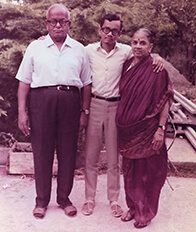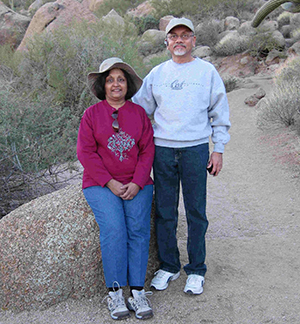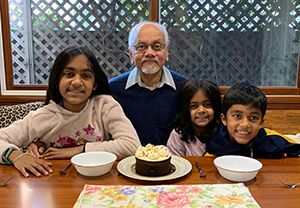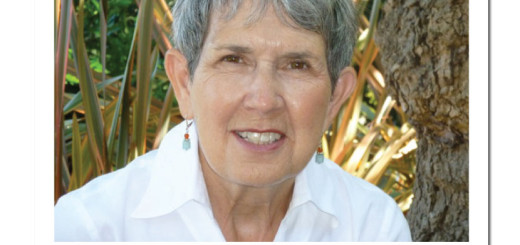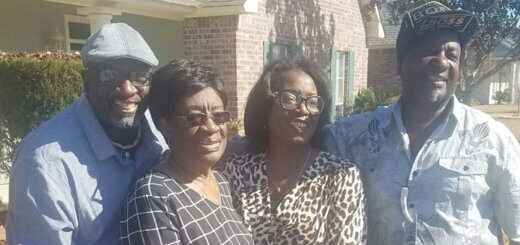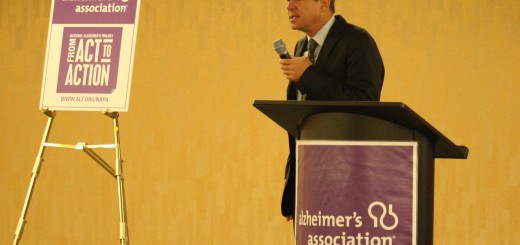South Bay resident helps provide resources to South Asian community
After losing his wife to cancer, Mukund Acharya left his career of 40 years in aerospace to dedicate his life to helping others living with chronic disease navigate the care system. He cofounded a non-profit that offers resources to the South Asian community. Mukund is partnering with the Alzheimer’s Association® to provide dementia resources to his community.
Helping his mother
Mukund Acharya married his wife Sandhya in the 1970s while attending Stanford University. After completing his PhD in mechanical engineering, Mukund began working for NASA in the Bay Area. He was considering a research opportunity at Princeton University when Mukund’s mother called and said she needed help caring for his father back in India.
In the 1970s, information around Alzheimer’s and other dementias was harder to find than it is today. While Mukund’s father was never properly diagnosed, doctors suggested that his father had both dementia and Parkinson’s.
“I put my career on hold and went back to India to help Mom take care of the day-to-day tasks,” said Mukund. “In the last three years of my dad’s life, my mother cared for him night and day. Boy, was she magnificent!
“My wife Sandhya and I stayed with my parents and provide the best support we could, while Mom looked after my dad. I’ve never regretted it.”
Caring for his wife
After his father passed, Mukund and Sandhya moved to Switzerland with their one-year old son, and later returned to the United States. Mukund spent 40 years in academia and the aerospace industry working in research and development, not only in the United States, but in India and Switzerland as well.
Sandhya began to deal with various health issues in 2007. In 2010 she was diagnosed with breast cancer and for five years Mukund was her caregiver. Mukund found that navigating the healthcare system was much harder than it should have been.
“Being her caregiver and watching her go through her patient experience and treatment led me to realize there is so much complexity in the health-care system,” said Mukund. “Navigating that system is a challenge, both for the patient and the caregiver. There is a lot of education [needed] for people who are likely to go through the experience we went through, and I’ve seen others go through.”
After his wife died in 2014, Mukund decided it was time for a career change and left the aerospace industry to begin a life in the non-profit world. “I decided that I wanted to spend the rest of my active life in volunteer service or what I call ‘social entrepreneurship,’” said Mukund.
“I wanted to be in patient advocacy, educating and building awareness of the need to focus on aging well, and getting prepared for the transitions life throws at us. This is my eighth year in that process. I’m not retired, I’m re-tired. I have a new set of Michelins and I’m still going 65 miles per hour.”
Receiving care under stress
According to the Alzheimer’s Association 2022 Alzheimer’s Disease Facts and Figures report, 88% of Asian Americans report that they have experienced barriers to receiving excellent Alzheimer’s and dementia care. Among non-White caregivers, half or more say they have faced discrimination when navigating health care for their care recipient, with the top concern being that providers do not listen to what they are saying because of their race, color or ethnicity.
Thirty-four percent of Asian Americans report they have experienced discrimination when seeking health care. However, nearly two-thirds (63%) of Asian Americans feel confident they have access to providers who understand their ethnic or racial background and experiences.
“Regardless of ethnicity, navigating a complex medical system, with health facilities, hospitals or nursing homes is very difficult,” said Mukund. “There is a lot of learning and advocacy to be done – advocate for yourself, ask questions and learn from the answers.
“It’s a complex project, being a patient or a patient-oriented caregiver. What ethnicity does, is that there are cultural sensitivities that overlay that.”
Here are some cultural issues that Mukund believes could be barriers to getting the best care:
- A doctor is seen as an authority figure and in some Asian cultures, questioning authority is something that is not done.
- Doctors can speak so quickly that important information may be missed. This is especially true for patients whose first language isn’t English.
- Medical staff in the United States may have accents based on where they grew up (i.e., New York or the South, or abroad). Depending on where a patient learned English, the clinician’s accent might make it harder to understand what is being said.
“When you’re under stress, you don’t process information well,” said Mukund. “If you feel overwhelmed, the ability to quickly understand what someone is saying in an accent or foreign language becomes an issue.”
Mukund recommends that, if possible, everyone should take notes during medical appointments. Mukund said, “Sandhya and I would each make notes, and compare them later to see if she’d missed something or I’d miss something. Afterwards, Sandhya would ask her questions and I’d follow up with mine.”
Helping the South Asian community
Currently Mukund is involved with both a hospital and hospice agency, serving on various committees and boards, making sure that patients, regardless of ethnicity, are receiving the care and support they need to be successful.
In addition to this, he also founded a non-profit: Sandhya’s Touch and co-founded another: Sukham.
Sandhya’s Touch
Sandhya’s Touch was created in Sandhya’s memory to fund projects that support patients and families dealing with chronic illnesses or diseases, such as cancer or Alzheimer’s disease. Sandhya’s Touch also sponsors community education and outreach events that will result in better care for patients.
“We’ve been doing this for a year and a half,” said Mukund. “We’ve funded about half a dozen really good projects.”
Sukham
Sukham focuses on informing the community. The word “sukham” in Sanskrit means peace, joy or contentment, which is at the core of Sukham’s motto: “Live Healthy, Age Well, Find Peace and Joy.”
The aim of this non-profit is to help the South Asian community prepare for age-related issues including illness and death. “People are frequently ill prepared,” said Mukund. They don’t have advance health care directives or a quality-of-life plan.
“We’re all part of the same culture, tradition, heritage and cultural sensitivities. We educate and empower the community to get ready for the end of life, even as they live every day to the best of their ability.”
Partnering with the Alzheimer’s Association
Through Sukham, Mukund has partnered with the Alzheimer’s Association to help raise awareness within the South Asian community. Mukund does at least two webinars with the Association every year.
Earlier, he formed a similar partnership between Sukham and Stanford Hospital, one of the hospitals where he volunteers, to bring education and awareness webinars to the community. Now Mukund has become a Community Educator for the Alzheimer’s Association.
“As with everything, if it becomes a community partnership, then things succeed,” said Mukund. “It takes a village to raise a child, it takes a village to do a lot of things.
“When we move into societies like in the western world, we need to create these villages. This is one way of doing that. We’re creating a community where we care for each other.
“People are good at heart. They want to do something for others, finding structured ways to do that helps the communities. No single thing gets you there, all the little things put together are essential to make that happen.”
Resources for South Asians
In some Asian cultures there is a stigma around sharing personal family problems. Mukund hopes that by partnering with the Alzheimer’s Association he can provide resources to the South Asian community, while being aware of cultural sensitivities.
“We want to look after our own and do anything we can to support our families. We take a lot upon ourselves,” said Mukund.
“Since we don’t like to discuss things, we hold things within ourselves. Then as caregivers it builds isolation and stress, and it impacts the caregivers physically and mentally.
“Being able to say it’s okay to talk about things and it’s okay to share and ask the questions you need to be better informed as a caregiver. Or to learn to look after yourself first. It’s easier if the message comes from someone in your own community.”
When it comes to dementia resources, Mukund is hopeful that people in the South Asian community will come to Sukham and ask for help. “We provide a list of resources,” said Mukund. “Rather than reinvent the wheel, we partner with the Alzheimer’s Association who already has resources available.
“We share the website and the phone number (800.272.3900). We use our ability to leverage existing resources to educate, empower and enable the community to live well and care for themselves.”
You can find out more about Sandhya’s Touch and Sukham at their respective websites.
Visit our website to learn more about Asian Americans and Pacific Islanders and Alzheimer’s.
Learn more:





